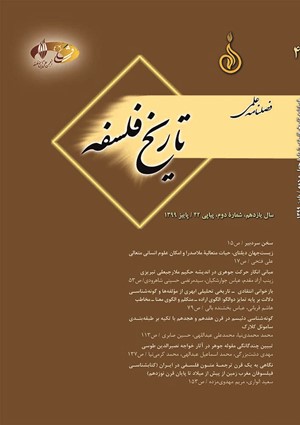تبیین چندگانگی مقوله جوهر در آثار خواجه نصیرالدین طوسی
محورهای موضوعی : ریشهشناسی واژگان (اتیمولوژی) فلسفیمهدی دشتبزرگی 1 , محمداسماعیل عبدالهی 2 , محمد کرمی نیا 3 *
1 - استادیار گروه ادیان و فلسفه، دانشگاه کاشان، ایران
2 - عضو هیئت علمی گروه ادیان و فرق حوزه علمیه قم، دکترای عرفان و تصوف اسلامی، دانشگاه ادیان و مذاهب، قم، ایران
3 - دانشجوی دکتری کلام امامیه، دانشگاه قرآن و حدیث، قم، ایران
کلید واژه: تعارض جوهر خواجه نصیرالدین طوسی اساس الاقتباس تجرید الاعتقاد,
چکیده مقاله :
خواجه نصیرالدین طوسی در آثارش گاه دو رأی مختلف در مورد یک مسئلة علمی ارائه داده است، یکی بشیوۀ اهل کلام و دیگری بشیوۀ فلاسفه. در وهلۀ نخست ممکن است تصور شود که خواجه به ورطۀ تعارض فرو افتاده است اما تحلیل مباحث نشان میدهد که این تعارضها صوری هستند و در چارچوب نظام کلی اندیشۀ وی قابل تبیینند. یکی از این موارد متعارض دربارۀ مقولۀ جوهر است. خواجه در آثار منطقی خود جوهر را همانند حکمای مشاء، مقوله یا جنسالاجناس شمرده اما در تجرید الاعتقاد، جوهر را معقول ثانی دانسته است. مقالۀ پیشرو به تبیین این چندگانگی مقوله جوهر پرداخته، سپس در مقام داوری، احتمالات ممکن را مطرح کرده و از میان آنها، رأیی که بنظر میرسد با واقعیت مطابق است را بعنوان نظر مختار نویسندگان، معرفی مینماید. مقاله با استناد به عبارات خواجه نصیر و در نظر داشتن موقعیت اجتماعی و علمی دورۀ حیات وی که با هجمۀ گسترده متکلمان بر ضد فلاسفه مواجه بود، همچنین با توجه به شخصیت متعادل و حقمحور و دانشدوست خواجه، نشان میدهد که این تعارض بدوی است نه واقعی. این تحقیق بر اساس پژوهش در آثار خواجه نصیر و بروش کتابخانهیی صورت گرفته است؛ گرچه گاه بضرورت بحث، دیدگاههای شارحان وی نیز مد نظر بوده است.
Khwājah Naṣīr al-Dīn Ṭūsī has sometimes provided two different views regarding a scientific problem, one following the method of the people of kalam and the other following the method of philosophers. At first sight, one might assume that Ṭūsī is making contradictory comments; however, an analysis of his discussions reveal that such contradictions are only superficial and can be explained justifiably within the framework of his general system of philosophy. One of such contradictory cases pertains to the category of substance. In his works on logic, similar to Peripatetic philosophers, Ṭūsī considers substance to be a category or genus of genera; however, he deemed of substance as a secondary intelligible in his Tajrīd al-i‘tiqād. The present paper aims to clarify this view of the multiplicity of the category of substance. Then, in order to judge its legitimacy, the authors pose some possibilities and finally introduce one of the views which seems to be compatible with reality as their own standpoint. Through referring to Ṭūsī’s words and considering his social and academic position during his time, when philosophers were under huge attacks by mutikallimun, as well as given his moderate, truth-loving, and academic character, the authors demonstrate that this contradiction is superficial rather than real. Following the library method, this research was conducted based on a thorough study of Ṭūsī’s works. Nevertheless, the researchers also took the views of his commentators into consideration when necessary.
حسنزاده آملی، حسن (1433ق) تعلیقه علی کشف المراد، قم: موسسة نشر اسلامی.
حسنی، سیدحسین (1372) بررسی و داوری در مسائل اختلافی میان دو فیلسوف اسلامی؛ خواجه نصیر و فخر رازی، تهران: دانشگاه تهران.
حلی، حسن بن یوسف (1363) الجوهر النضید فی شرح منطق التجرید، قم: بیدار.
حلی، حسن بن یوسف (1413ق) کشف المراد فی شرح تجرید الإعتقاد، تصحیح حسن حسنزاده آملی، قم: مؤسسة نشر اسلامی.
سبزواری، ملاهادی (1413ق) شرح منظومه، تصحیح و تعلیق حسن حسنزاده آملی، تهران: نشر ناب.
سهروردی، شهابالدین یحیی بن حبش (1372) مجموعه مصنفات شیخ اشراق، تهران: مؤسسه مطالعات و تحقیقات فرهنگی.
طباطبایی، سیدمحمدحسین (1390) بدایة الحکمة، تحقیق عباسعلی زارعی سبزواری، قم: مؤسسۀ آموزشی و پژوهشی امام خمینی.
طوسى، نصیرالدین محمد (1335) مجموعه رسائل، به اهتمام محمدتقی مدرس¬رضوی، تهران: دانشگاه تهران.
طوسى، نصیرالدین محمد (1367) اساس الإقتباس، تصحیح محمدتقی مدرس رضوی، تهران: دانشگاه تهران.
طوسى، نصیرالدین محمد (1425ق) شرح اشارات و التنبیهات، تحقیق حسن حسنزاده آملی، قم: بوستان كتاب.
قمی، شیخ عباس (بی¬تا) الکنی و الألقاب، تهران: مکتبة الصدر.
قوشچی، علاءالدین علی بن محمد (1382) شرح تجرید العقائد، تهران: میراث مکتوب.
کرمی¬نیا، محمد (1399) تبیین تعارض یا عدم تعارض در آراء فلسفی و کلامی خواجه نصیرالدین طوسی، پایاننامه کارشناسی ارشد براهنمایی دکتر مهدی دشتبزرگی، دانشگاه کاشان.
لاهیجی، عبدالرزاق (1425ق) شوارق الالهام فی شرح تجرید الکلام، تحقیق اکبر اسدعلیزاده و مقدمه جعفر سبحانی، قم: مؤسسة امام صادق(ع).
مدرس رضوی، محمدتقی (1386) احوال و آثار خواجه نصیرالدین طوسی، تهران: اساطیر.
ملاصدرا، محمد بن ابراهیم (1368) الحكمة المتعالیة فى الأسفار الأربعة، قم: مصطفوی.

